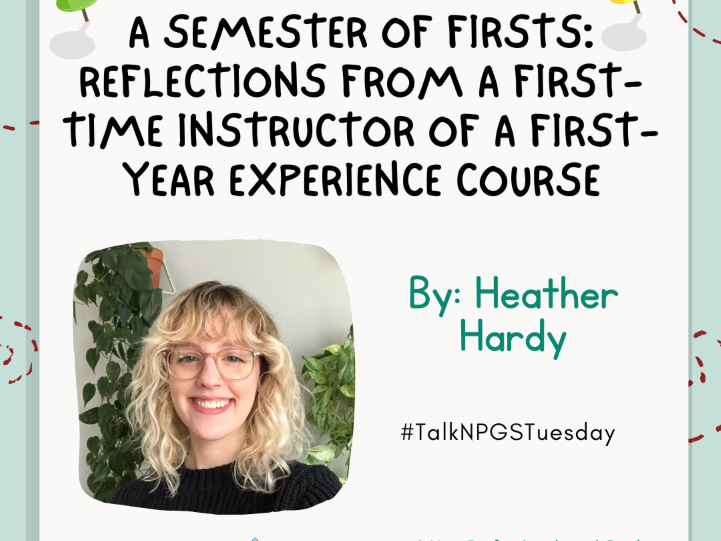
A Semester of Firsts: Reflections from a First-Time Instructor of a First-Year Experience Course
New Professionals and Graduate Students
January 10, 2023
First-year experience (FYE) courses have become a critical retention tool at many higher education institutions to help orient freshmen and new transfer students to their university environment and resources for success (Wismath & Newberry, 2019). As a new academic advisor at NYU Steinhardt, I was charged this fall with teaching New Student Seminar (NSS), an FYE course for 47 new students in the undergraduate Music Technology program. With my first semester now behind me, here are some key takeaways I’d like to share with other first-time instructors of an FYE course based on my personal successes and misadventures:
Use curricular resources at your disposal.
Sample teaching materials are often available to instructors teaching a first-year experience course for the first time. For example, since NSS is a college-wide initiative at my institution, advisors are asked to adopt shared language for our syllabi, including a course description, learning objectives, and academic policies. This foundation served as a reminder for me to not “reinvent the wheel” and instead align around common goals for my course within the greater context of NYU.
In my course planning, I was also fortunate that NYU encourages NSS instructors to sign up for workshops facilitated by other offices on campus to introduce students to further areas of the university. I was able to sign up for a study skills/time management workshop facilitated by our college Student Affairs team, a student jobs/internships workshop led by our university’s career counseling office, and a library navigation workshop run by two fantastic first-year experience librarians. These assigned facilitators took full ownership over creating materials, activities, and slides, and the only work on my end was coordinating some logistics. Our class benefited greatly from these teams’ expert content knowledge, and my burden as an instructor was reduced by not actively needing to teach every lesson.
Integrate major-specific content to boost engagement.
The aspects of my course that most engaged students were the sessions that focused on major-specific questions, issues, and trajectories. This included a guided tour of our program’s new recording studio, an open Q&A session with upperclassmen, and a lecture on ear protection for musicians led by a professional audiologist. A common theme I observed throughout these sessions was how seriously students took them as professionalization tools – their intrinsic motivation to pay attention and ask questions was enhanced by the obvious connection they could see between the content and their chosen future. Experiences like these can be highly validating for new students who crave feelings of legitimacy in their major; students want to feel that they’re receiving the kinds of professional training and exposure they hoped to engage with by pursuing a specialized college education. As advisors, we can support students in accessing some of the validating experiences they crave that in turn help them find belonging in their new major.
Use your FYE course to foster peer-to-peer and advisee/advisor relationships.
My NSS course was greatly enhanced by the support of two (paid) upperclassmen peer mentors. Our mentors participated in all our class sessions and hosted office hours each week, which we required all new students to attend at least once. Over time, the students in the class came to see their peer mentors as reliable and trustworthy figures who could provide honest advice into future pathways in the major, such as recommended electives, where to seek out internships, and how to build connections with faculty. Mentors could also offer valuable personal insight, such as navigating the New York City music scene on a budget and balancing academic responsibilities with social needs. Our class dynamic wouldn’t have been the same without our peer mentors helping to increase buy-in to our weekly activities and providing informal peer-to-peer support that often served as a gateway to more formal helping outlets.
As an advisor, I used NSS as a vehicle for learning the names and personalities of a quarter of my newly assigned cohort. Our weekly in-person meetings also provided a guaranteed venue to follow up with students who had questions, issues, or action items but were not always responsive to email. These check-ins helped clarify my role to the new students while ensuring they didn’t get left behind in the context of a huge and unfamiliar university environment.
Learn from student feedback so you can improve for next time.
From reading my course evaluations, I know I have opportunities to improve how I organize and teach NSS for my next new student cohort. I was proud to see that students rated me highly as an instructor, citing my sensitivity to student needs and willingness to provide extra support, but I learned that students wanted our non-major-specific lessons to feel more intellectually stimulating. There is always room to grow in this field, and I look forward to developing this course for future MTech students to come.
Author: Heather Hardy (she/her) is the Academic Advisor for the undergraduate Music Technology program at New York University and a member of the NPGS SC Professional Development Working Group. A devoted student advocate, Heather leverages her power as an institutional “insider” and faculty partner to dismantle barriers inhibiting students’ access to critical resources for success. Heather is a proud first-generation, low-income student who earned her B.M. in Music Education from New York University and her M.Ed. in Higher Education Administration from Northeastern University. You can connect with her on LinkedIn.
References
Wismath, S., & Newberry, J. (2019). Mapping assets: High-impact practices and the first-year experience. Teaching & Learning Inquiry, 7(1), 34–54. http://dx.doi.org/10.20343/teachlearninqu.7.1.4